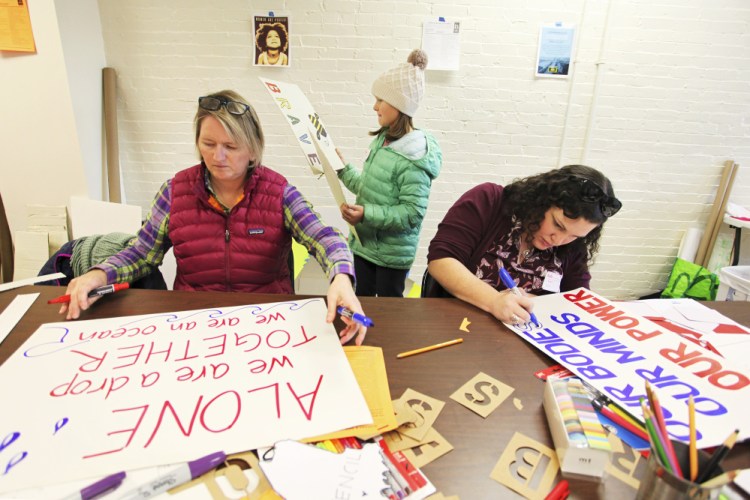Michelle Fournier of Falmouth doesn’t normally broadcast her political views.
But after the presidential election her political reticence suddenly vanished, said the French and Spanish teacher at Falmouth Middle School.
“These are unusual times. I don’t want to see us lose progress. I worry about immigrants and my two daughters,” said Fournier, 46.
Fournier is among of thousands of Mainers gearing up for the Women’s March on Washington on Saturday, the day after Donald Trump’s inauguration as president. She is riding down on one of a fleet of buses leaving Maine on Friday and returning Sunday morning.
She and dozens of other women and a few men and children spent Sunday afternoon in a vacant third-floor office in a building on Preble Street in Portland making signs to carry in the march. Fournier is part of a liberal grassroots movement energized against Trump’s conservative agenda, which his opponents say threatens to trample on human rights.
For many, it will be their first public display of their political views.
“I am a lawyer by training and I am comfortable with advocacy, but this a first-time effort for me, as it is for many,” said Kristen Farnham, 48, of Falmouth, a mother of three who works at a Maine behavioral health nonprofit.

Lucy Knauft, 10, of Cape Elizabeth works on her message “I Want Equality” while making signs with her parents at 24 Preble Street on Sunday afternoon.
Farnham is leaving Friday with two carloads of friends, who will stay at a friend’s brother’s place in Bethesda, Maryland, and take the Metro into Washington on Saturday morning. She plans to be back at work Monday morning. She said all the effort involved to get there and back is worth it.
“I felt like our country had made tremendous progress and we are not interested in moving backwards. My hope is to give voice to these values and reinforce them,” said Farnham.
Organizers estimated Sunday that 4,000 Mainers would be at the march Saturday, many of them leaving Friday on 25 buses from points across Maine, including parking lots at Whole Foods Market and Thompson’s Point in Portland. Others are heading to the nation’s capital by train, plane and automobile.
Native Mainers now residing out of state will be traveling from all corners of the country and the world, including one woman living in Kazakhstan.
Many of the Maine participants plan to march together, donning the pink hand-knit hats made by Maine knitters and crocheters as part of the Pussyhat Project – a reference to Trump’s 2005 videotaped remarks about grabbing women without their consent – and blaze orange scarves and mittens.
“Look for us in our crazy, blaze orange and bright pink,” said Erica McNally, 37, an environmental scientist of Cape Elizabeth and a regional coordinator of the march.
The Women’s March on Washington was launched by a Hawaiian grandmother on her Facebook page the day after the Nov. 8 election. About 200,000 marchers are expected, according estimates Sunday by organizers of the grassroots protest, which is aimed at equal rights for women.
Mainers are planning to start gathering in Washington at 7:30 a.m. Saturday at the Garden of the Hirshhorn Museum, at the corner of 7th St. SW and Independence Avenue, and start walking to the rally point at 9 a.m. for the 10 a.m. march.
Instate protests are also being organized, including marches in Portland, Augusta and Brunswick.
Mainers have devised other ways to show their support for the marchers. Trish Brigham, Megan Botlz and Abigail Maker, all of k colette, a Portland decor store, designed protest pins to raise money for Planned Parenthood, the Natural Resources Defense Council and other organizations that promote the principle of “one nation, indivisible with liberty and justice for all.”
As of Sunday, the three had sold close to 400 pins in six weeks, at $8 apiece. Brigham plans to sell the pins at the Women’s March on Washington.
Genevieve Morgan, 50, of Portland – the Maine state coordinator for the march who will be riding to Washington on a bus – said the organizers were able to raise enough money to send 125 Mainers who would not otherwise have been able to afford the trip.
Morgan said $20,000 was donated by the family of the late Maine state Rep. Marion Fuller Brown of York, who sponsored a law that banned billboards throughout the state. The law was upheld by the U.S. Supreme Court.
Send questions/comments to the editors.



